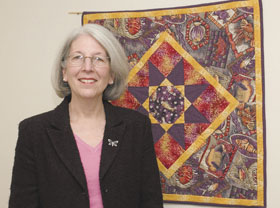  |
| HOME | THIS ISSUE | CALENDAR | GRANTS | BACK ISSUES | < BACK | NEXT > |
Medical sociologist to bridge gap between research, practiceby Pat Keefe - November 7, 2005 |
||||
|
Judith Fifield is interested in translational research – the type that takes research from clinical trial to practice and the community. Fifield, a professor of family medicine, figures out ways to get new knowledge from labs, medical facilities, and research groups into the hands of practitioners and people whose health it can improve. The approach is known as T2 research. Previously the director of research in family medicine and program director of the UConn K-12 Center for Interdisciplinary Research in Women’s Health, Fifield has been named director of the Health Center’s Health Policy and Primary Care Research Center, effective Nov. 1. In her new position, she will develop an infrastructure to support the growth of T2 translational research at the Health Center by fostering large, interdepartmental translational research projects, and offering collaborative planning and development of projects with local and regional agencies, foundations, and units across the University. “I’m interested in doing work that has immediate benefit for people,” she says. “There’s a tremendous need to try to close the gap between research and practice. Introducing research into the real world of healthcare is one of my highest priorities.” A medical sociologist with a nursing background, Fifield’s research focuses on community and reducing health disparities. She has a number of success stories, and has more than $2 million in grants from the government and the Donaghue Foundation to develop others. Two of the investigations she now has underway are a faith-based weight-loss program called Sister Talk; and a pediatric asthma study known as UCAN Control Asthma (UConn and Community health centers Asthma Network). The Sister Talk model was originally developed by researchers at Brown University to address the problem of obesity in the African-American community.
Despite cultural adaptations, however, the program wasn’t as effective as expected. In Hartford, translating the model into a faith-based program in collaboration with the churches has improved its acceptance. Working with church women and putting the program in the language of their faith made it more effective, Fifield says. The women stuck with the program and it resulted in significant weight loss. “In the weight-loss program, we partnered with Hartford churches and women who wanted to lose weight,” she says. “The women say to us, ‘We lost weight, but it’s what we gained that counts.’ What they gained was a sense of control and sisterhood from the group sessions.” Pediatric asthma is a chronic condition of inner-city kids. UCAN investigated a new approach using web-based decision support to improve pediatric asthma outcomes. Fifield is the local primary investigator. “This is a translational research problem,” she says. “Guidelines are developed but are not adopted. We developed a practice-based approach to enhance adoption by providers and kids with asthma. Our findings show it was successful.” |
| ADVANCE HOME UCONN HOME |

